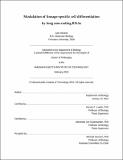Modulation of lineage-specific cell differentiation by long non-coding RNAs
Author(s)
Alvarez, Juan (Juan Rene Alvarez Dominguez)
DownloadFull printable version (49.74Mb)
Other Contributors
Massachusetts Institute of Technology. Department of Biology.
Advisor
Harvey F. Lodish and Alexander van Oudenaarden.
Terms of use
Metadata
Show full item recordAbstract
Mammalian genomes comprise thousands of non-protein-coding genes. These can produce small non-coding RNAs (such as rRNAs and tRNAs), as well as long non-coding RNAs (lncRNAs), which are >200nt and resemble mRNAs in their biogenesis. Although the functions of the vast majority of lncRNAs remain unknown, many are tissue- and developmental stage-specific, suggesting roles in lineage-specific development. We generated deep transcriptome surveys from differentiating mouse red blood cells, and implemented a computational strategy for de novo lncRNA discovery to comprehensively catalog erythroid-expressed lncRNAs. We found >100 previously unannotated loci, many of which are erythroid-specific and are induced by key erythroid transcription factors during differentiation. We exploited these features to select 12 candidates for loss-of-function studies, and found that depleting 10 out of 12 impaired red cell maturation, inhibiting cell size reduction and subsequent enucleation. To study how lncRNAs regulate erythropoiesis, we focused on EC6, an unpolyadenylated lncRNA needed for silencing neighboring loci encoding NF-kB activators. De-repression of these genes upon EC6 knockdown leads to activation of NF-kB and other immune pathways that antagonize erythropoiesis, resulting in impaired proliferation and elevated apoptosis during differentiation. We showed that EC6 is retained in chromatin and binds the nuclear matrix factor hnRNP U, which may enable co-localization with its targets to mediate their repression. Extending our work to a different lineage, we reconstructed transcriptomes from distinct mouse adipose tissues and identified ~1500 lncRNAs. These included many brown fat-specific loci induced during differentiation which are targets of key adipogenic factors. Inhibiting one of them, lnc-BATE1, compromised brown adipocyte development, impairing activation of brown fat genes, mitochondrial biogenesis, and thermogenic function. We showed that lnc-BATE1 acts in trans and binds hnRNP U, which is also required for proper brown adipocyte maturation. This work demonstrates that lncRNAs modulate lineage-specific cell differentiation by promoting or suppressing competing gene expression programs controlling cell fate.
Description
Thesis: Ph. D., Massachusetts Institute of Technology, Department of Biology, 2015. This electronic version was submitted by the student author. The certified thesis is available in the Institute Archives and Special Collections. Cataloged from student submitted PDF version of thesis. Includes bibliographical references.
Date issued
2015Department
Massachusetts Institute of Technology. Department of BiologyPublisher
Massachusetts Institute of Technology
Keywords
Biology.